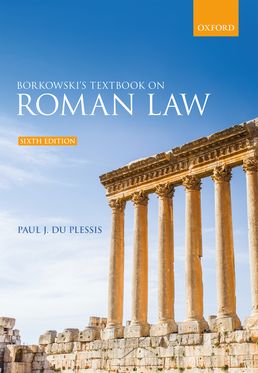Borkowski's Textbook on Roman Law

Borkowski's Textbook on Roman Law
|
ISBN: |
9780198848011 |
|
Binding: |
Paperback |
|
Published: |
23 Apr 2020 |
|
Availability: |
14
|
|
Series: |
$101.95 AUD
$110.99 NZD
Add To Cart Request an inspection copyDescription
The book gives a comprehensive overview of both the historical context and modern relevance of Roman law today. Included are references to a wide range of scholarly texts, to ground the judicious account of Roman law firmly in contemporary scholarship. There are also examples from legal practice, as well as truncated timelines at the start of each chapter to illustrate how the law developed over time.
The book contains a wealth of learning features, including chapter summaries, diagrams and maps. A major feature of the book is the inclusion of translated extracts from the most important sources of Roman law: the Digest and the Institutes of Justinian. Annotated further reading sections at the end of each chapter act as a guide to further enquiry.
Digital formats and resources
This edition is available for students and institutions to purchase in a variety of formats, and is supported by online resources.
- The e-book offers a mobile experience and convenient access along with functionality tools, navigation features, and links that offer extra learning support: www.oxfordtextbooks.co.uk/ebooks
- The online resources include:
* Self-test questions on the key topics of Roman law give students the opportunity to test learning. These questions test factual knowledge to help consolidate understanding of key topics and they are interactive providing the correct answer to each question and a reference to the relevant part of the textbook.
* Revision sheets and sample essay questions aid exam preparation.
* An interactive timeline supplements the list of dates featured in the introduction to the textbook. It may also be used as a schematic guide to chapter 1 (Introduction: Rome-a historical sketch). The timeline provides a chronological overview of the development of Roman private law in its political and historical context.
* Short biographies of key figures to be used in conjunction with the timeline to supplement the discussion of the jurists in chapter 2 (The sources of Roman law).
* There is also a glossary of Latin terms; annotated web links; guidance on finding Roman law texts and associated literature; and tips regarding textual analysis to guide the reader in interpreting the texts.
Contents
I. The Roman Legal System
2: The sources of Roman law
3: Roman litigation
II. The Law of Persons
4: Status, slavery and citizenship
5: The Roman family
III. The Law of Property and Inheritance
6: Interests in property
7: Acquiring ownership
8: Inheritance
IV. The Law of Obligations
9: Obligations: general principles and obligations arising from contracts
10: Obligations arising from delict
V. Roman Law and the Modern World
11: Roman law and the European ius commune
Authors
Paul J. du Plessis , Professor of Roman Law, University of Edinburgh, School of Law
Paul J. du Plessis holds the chair of Roman law at the University of Edinburgh. He is a legal historian whose research focuses predominantly on the multifaceted and complex set of relationships between law and society in a historical context. His main field of research is Roman law (with specific reference to property, obligations and, to a lesser extent, persons and family). Within this field, he is mainly concerned with the contexts within which law operates and the extent to which modern socio-legal methodologies can be applied to historical material from the Roman period in order to further our understanding of Roman law. To that end, his work is mainly concerned with the formulation of a methodology for 'law and society' research with reference to the Roman Empire. In the context of his interest in law and society, his research also focuses on a further period where Roman legal principles were used to create law, namely the period of the European ius commune in the late Middle Ages.